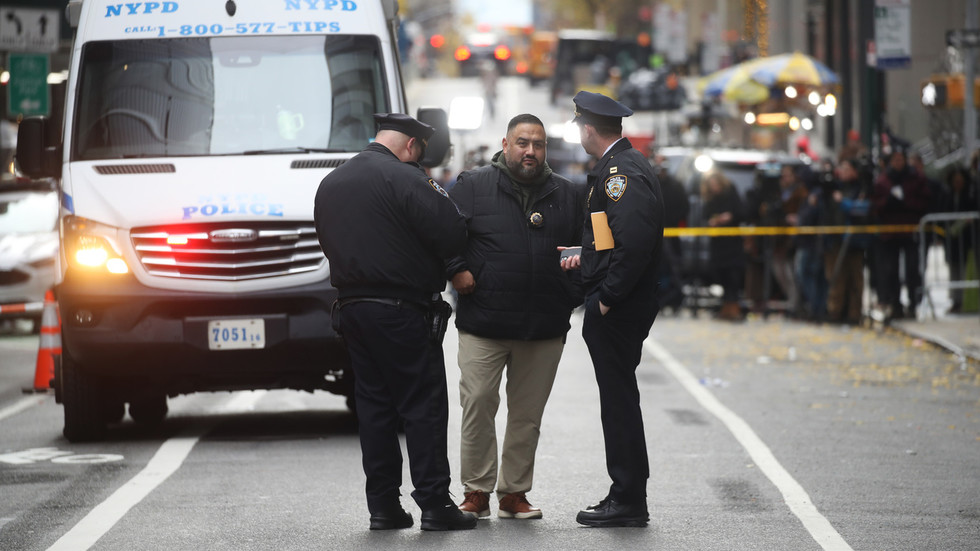In the wake of the shocking assassination of UnitedHealthcare CEO Brian Thompson in Manhattan, the New York Police Department (NYPD) has issued a warning to healthcare executives regarding their safety. The incident, which took place outside a Hilton hotel, has heightened security concerns in the corporate sector, particularly within the healthcare industry. Following the shooting, a suspect, Luigi Mangione, was apprehended and charged with second-degree murder. The NYPD’s safety bulletin has underscored the volatile atmosphere surrounding the incident, highlighting the emergence of ‘wanted’ posters across the city. These posters not only feature Thompson’s face but also those of other healthcare leaders, amidst hostile messages regarding their roles in denied medical claims, sparking fears of increased hostility toward corporate executives.
The posters convey a profound discontent with corporate healthcare practices, linking Thompson’s death to the negative impact of profit-driven decisions that have allegedly resulted in denied claims and adverse health outcomes for patients. Messages accompanying the images convey a sense of revenge against those perceived to have made detrimental choices affecting lives. One such poster affirms that Thompson was “denied his claim to life,” which encapsulates the deep-seated frustrations many Americans feel towards the healthcare system and the corporate executives governing it. This narrative of victimization serves to rally support for further actions against those in similar positions of power and aggravate the prevailing tensions surrounding healthcare accessibility and corporate accountability.
The NYPD’s bulletin also indicated a troubling trend on social media, where some users have reacted to Thompson’s assassination with approval or encouragement for subsequent violent actions against corporate leaders. The bulletin warned that Mangione could potentially be viewed as a “martyr,” instigating a wave of violence potentially inspired by extremist ideologies. For instance, users have shared personal grievances and articulations decrying corporate leaders’ perceived lack of empathy in the face of their clients’ suffering. Such reactions not only reflect individual frustrations but may also point to a larger societal sentiment calling for drastic accountability from high-earning executives who direct large corporate healthcare entities.
The radical sentiments expressed online illustrate a dangerous rising tide of animosity toward CEOs, as individuals cite personal experiences of healthcare failures that they attribute to the decision-making of corporate executives. For many, the consequences of denied healthcare coverage have been felt deeply, leading to emotional expressions of anger and vengeance online. A notable commentary from a social media user lamented the loss of her mother’s cancer diagnosis due to corporate neglect, underscoring the personal impact of high-level corporate decisions. These sentiments reveal how grievances rooted in individual health experiences are translating into broader societal calls for change, and potentially for violence.
Timothy Gallagher, a former FBI agent, emphasized the pressing need for caution given the emotional responses tied to Thompson’s death and the potential for further violence. Gallagher articulated the genuine concern for copycat scenarios encouraged by the visibility of the assassination and the divisive rhetoric circulating online. The intersection of grievances with extremist elements can create a volatile situation for corporate executives, posing a heightened risk to their safety as the public discourse increasingly frames them as targets rather than leaders. The prevailing climate calls for heightened security measures and thoughtful responses from corporate entities and law enforcement alike, aimed at both protecting executives and addressing the root causes of public outcry.
As the investigation continues and the socio-political implications of this incident unfold, a reevaluation of the healthcare system’s accountability mechanisms may become imperative. Stakeholders in the healthcare industry will need to engage with the arising discontent and work towards restoring public trust. This incident may serve as a catalyst for critical discussions on healthcare reform, emphasizing the need for a system that prioritizes patients’ needs over profit margins. As the nation grapples with the aftermath of Thompson’s assassination, the spotlight on corporate accountability in healthcare is likely to intensify, necessitating responses that address societal grievances while ensuring the safety of those within the corporate sphere. The challenge will be to find a balance between protecting executives and effectively responding to the genuine concerns held by the public.

